Meet Your Military
- Details
- Hits: 3402
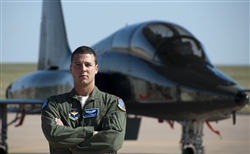 PHOTO: Air Force 2nd Lt. Kyle Wheeler once prepared weapons for F-15C Eagles as an air munitions maintenance operator. U.S. Air Force photo by Airman 1st Class Robert McIlrathSHEPPARD AIR FORCE BASE, Texas – An airman here is well on his way to fulfilling his dream of flying the same fighter jet he once turned wrenches on. After earning a commission and completing the initial stages of learning to fly, he is now ready to climb into the cockpit and fire the weapons he once loaded. Wheeler is a Euro-NATO Joint Jet Pilot Training program graduate with the 80th Flying Training Wing at Sheppard Air Force Base, Texas. Air Force 2nd Lt. Kyle Wheeler, a Euro-NATO Joint Jet Pilot Training Program graduate from the 80th Flying Training Wing here, once prepared weapons as an Air Force enlisted air munitions maintenance operator on the F-15C Eagle. After earning a commission and completing the initial stages of learning to fly, he is now ready to climb into the cockpit and drop the weapons he once loaded. Wheeler said he always knew he wanted to be a pilot, but the question was when and how. "I was always really passionate about airplanes as a kid," he said. "Growing up, I enjoyed the airplane ride to Disney World when I was 8 years old more than I really enjoyed Disney World itself. I've always had a fascination with airplanes."
PHOTO: Air Force 2nd Lt. Kyle Wheeler once prepared weapons for F-15C Eagles as an air munitions maintenance operator. U.S. Air Force photo by Airman 1st Class Robert McIlrathSHEPPARD AIR FORCE BASE, Texas – An airman here is well on his way to fulfilling his dream of flying the same fighter jet he once turned wrenches on. After earning a commission and completing the initial stages of learning to fly, he is now ready to climb into the cockpit and fire the weapons he once loaded. Wheeler is a Euro-NATO Joint Jet Pilot Training program graduate with the 80th Flying Training Wing at Sheppard Air Force Base, Texas. Air Force 2nd Lt. Kyle Wheeler, a Euro-NATO Joint Jet Pilot Training Program graduate from the 80th Flying Training Wing here, once prepared weapons as an Air Force enlisted air munitions maintenance operator on the F-15C Eagle. After earning a commission and completing the initial stages of learning to fly, he is now ready to climb into the cockpit and drop the weapons he once loaded. Wheeler said he always knew he wanted to be a pilot, but the question was when and how. "I was always really passionate about airplanes as a kid," he said. "Growing up, I enjoyed the airplane ride to Disney World when I was 8 years old more than I really enjoyed Disney World itself. I've always had a fascination with airplanes."
Read more: Meet Your Military: Former Enlisted Man Becomes Jet Pilot
- Details
- Hits: 3214
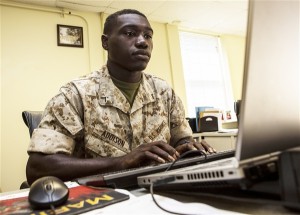 PHOTO: Marine Corps Pfc. Linard Addison Jr. checks to ensure the morning accountability report is correct at the 26th Marine Expeditionary Unit command post, Camp Lejeune, N.C., May 22, 2014. U.S. Marine Corps photo by Lance Cpl. Joshua W. Brown MARINE CORPS BASE CAMP LEJEUNE, N.C. – Marine Corps Pfc. Linard Addison Jr. said he was only 12 when his father died, and that his service is a way of fulfilling his late father’s expectations. “He told me I should strive to be the best, and that’s why I joined the Marine Corps,” he said. Addison -- who hails from Marion, South Carolina, and is an administrative specialist assigned to the 26th Marine Expeditionary Unit -- said he knew even at a young age that he wanted to serve. “My dad was in the Army, so for a while, that’s what I thought I wanted to do,” he said. “But when I got into high school, I realized that the Marine Corps was the best.” Addison said he didn’t have a specific specialty in mind, but he knew he absolutely wanted to be a Marine.
PHOTO: Marine Corps Pfc. Linard Addison Jr. checks to ensure the morning accountability report is correct at the 26th Marine Expeditionary Unit command post, Camp Lejeune, N.C., May 22, 2014. U.S. Marine Corps photo by Lance Cpl. Joshua W. Brown MARINE CORPS BASE CAMP LEJEUNE, N.C. – Marine Corps Pfc. Linard Addison Jr. said he was only 12 when his father died, and that his service is a way of fulfilling his late father’s expectations. “He told me I should strive to be the best, and that’s why I joined the Marine Corps,” he said. Addison -- who hails from Marion, South Carolina, and is an administrative specialist assigned to the 26th Marine Expeditionary Unit -- said he knew even at a young age that he wanted to serve. “My dad was in the Army, so for a while, that’s what I thought I wanted to do,” he said. “But when I got into high school, I realized that the Marine Corps was the best.” Addison said he didn’t have a specific specialty in mind, but he knew he absolutely wanted to be a Marine.
“I was real close to my dad, and I wanted to make my family proud,” he added. Addison said his mother and his siblings -- four brothers and two sisters -- were happy about his decision. “I’m the middle child,” Addison said. “I want to set the example for my younger siblings.” His younger sister recently turned 18, he added, and would like to be a Marine after she finishes college. “I want to set the example by coming in and working hard, doing my best, and improving myself every day,” he said. Though he is one of the youngest and most junior Marines in the unit, his responsibilities and expectations are the same as every other Marine in his section. “He works hard, he seeks to learn more, and he’s improving quickly,” said Marine Corps Sgt. Michael K. Burns, Addison’s noncommissioned officer in charge. As a Marine recently out of military occupational school, Addison is still in the process of learning all the facets of his profession. Burns said he is doing well and is a squared-away Marine. “You can tell he’s hungry to learn more,” Burns said.
Read more: Meet Your Military: Marine Sets Example for Siblings
- Details
- Hits: 3871
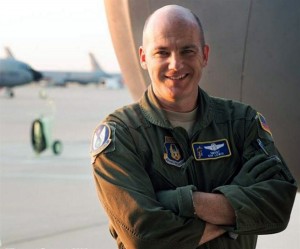 PHOTO: Air Force Senior Master Sgt. Ray Lewis, a refueling boom operator assigned to the Air Force Reserve’s 18th Air Refueling Squadron, 931st Air Refueling Group, McConnell Air Force Base, Kan., has been serving in the Air Force for more than 24 years and recently passed 6,500 total flight hours and 1,500 missions flown. Courtesy photo by Jonathan Pece Air Force MCCONNELL AIR FORCE BASE, Kan. – A reservist assigned here has reached a career milestone that was more than 24 years in the making. Senior Master Sgt. Ray Lewis, a refueling boom operator assigned to the Air Force Reserve’s 18th Air Refueling Squadron, 931st Air Refueling Group, recently passed 6,500 flying hours while at the same time tallying his 1,500th mission. Lewis said he sees the totals as less of a milestone and more of a reflection on the fact that he has been able to continue to fly regularly for his entire career. "I think I'm just lucky," he said. "I'm lucky in the sense that I've been able to stay in the Air Force for as long as I have and I've been able to continue to fly, serving as a reservist. I've been in the Air Force Reserve for more than 16 years of my career, and I get to fly roughly four hours a week, so it's really just been an accumulation of hours over the years." As a boom operator, Lewis' primary job is to control the KC-135 Stratotanker's refueling boom during air refueling operations.
PHOTO: Air Force Senior Master Sgt. Ray Lewis, a refueling boom operator assigned to the Air Force Reserve’s 18th Air Refueling Squadron, 931st Air Refueling Group, McConnell Air Force Base, Kan., has been serving in the Air Force for more than 24 years and recently passed 6,500 total flight hours and 1,500 missions flown. Courtesy photo by Jonathan Pece Air Force MCCONNELL AIR FORCE BASE, Kan. – A reservist assigned here has reached a career milestone that was more than 24 years in the making. Senior Master Sgt. Ray Lewis, a refueling boom operator assigned to the Air Force Reserve’s 18th Air Refueling Squadron, 931st Air Refueling Group, recently passed 6,500 flying hours while at the same time tallying his 1,500th mission. Lewis said he sees the totals as less of a milestone and more of a reflection on the fact that he has been able to continue to fly regularly for his entire career. "I think I'm just lucky," he said. "I'm lucky in the sense that I've been able to stay in the Air Force for as long as I have and I've been able to continue to fly, serving as a reservist. I've been in the Air Force Reserve for more than 16 years of my career, and I get to fly roughly four hours a week, so it's really just been an accumulation of hours over the years." As a boom operator, Lewis' primary job is to control the KC-135 Stratotanker's refueling boom during air refueling operations.
He communicates and coordinates with the receiving aircraft's pilot to ensure the safe transfer of thousands of pounds of jet fuel, all while the two aircraft are less than 30 feet apart, traveling at 500 miles per hour, 30,000 feet above the ground. Though he has spent the equivalent of nine months in flight doing the job, Lewis said, it never gets old. "I still get excited each time I'm scheduled to go fly," he said. "It's been that way ever since the first time I did an air refueling mission, back when I was just a 19-year-old kid. I've always loved the job, always loved being in the airplane. Honestly, I like being in the airplane more than I like being at home. That may sound weird, but I'm just very, very comfortable in the airplane, and I love doing the job." That excitement of doing the job has been a hallmark of Lewis's career, dating back to that very first mission. "I was excited and terrified at the same time," he said with a laugh.
Read more: Meet Your Military: Reservist Reaches Air Refueling Milestone
- Details
- Hits: 3174
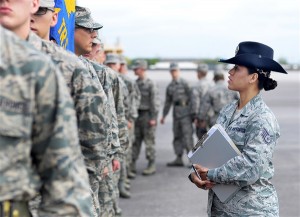 PHOTO: Air Force Staff Sgt. Maria Escobar, right, a military training instructor with the 737th Training Group, addresses a trainee during basic military training at Joint Base San Antonio-Lackland, Texas, May 20, 2014. U.S. Air Force photo by Benjamin FaskeARLINGTON, Va. – The Air Force basic military training instructor is vital to the development of making future airmen, and the Air National Guard plays a relevant role in that process. Escobar, a member of the Massachusetts Air National Guard, volunteered for MTI duty to teach and mentor future airmen. Air National Guard members who apply and are accepted carry out a four-year assignment as an MTI before returning to their home units.
PHOTO: Air Force Staff Sgt. Maria Escobar, right, a military training instructor with the 737th Training Group, addresses a trainee during basic military training at Joint Base San Antonio-Lackland, Texas, May 20, 2014. U.S. Air Force photo by Benjamin FaskeARLINGTON, Va. – The Air Force basic military training instructor is vital to the development of making future airmen, and the Air National Guard plays a relevant role in that process. Escobar, a member of the Massachusetts Air National Guard, volunteered for MTI duty to teach and mentor future airmen. Air National Guard members who apply and are accepted carry out a four-year assignment as an MTI before returning to their home units.
Air Force Staff Sgt. Maria Escobar is one of those Guard members. She left her human resources specialist job at the 102nd Intelligence Wing at Otis Air National Guard Base, Massachusetts, to begin her MTI tour at Joint Base San Antonio-Lackland, Texas, in 2010. Escobar said her own basic training experiences encouraged her to pursue her current path, which has taken her back to where it all began for her. “My military training instructor inspired me to become an MTI,” Escobar said. “She was a great leader and mentor and she exemplified what a true airman needed to be.” Escobar said her experiences of being on the 102nd Intelligence Wing honor guard, along with working in personnel, have had a positive effect on her MTI assignment.
Read more: Meet Your Military: Air National Guard Member Molds Future Airmen
- Details
- Hits: 3530
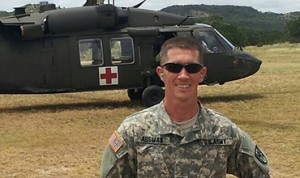 BETHESDA, Md. – Their school break was drawing to a close and Army 2nd Lt. Jason Ausman and his roommates, all first-year medical students at the F. Edward Hébert School of Medicine at the Uniformed Services University of the Health Sciences here, were looking forward to a carefree day of fun before classes resumed the next day. Ausman, along with fellow Air Force second lieutenants Taylor Roth and Doug Morte, headed to Jessup, Maryland, for some indoor electric go-kart racing at the Autobahn Indoor Speedway. Dick Talley, 69, had also gone with friends to Jessup from his home more than two hours away in southern Maryland for a day of Grand Prix-style go-kart racing at the speedway. Talley and his friends arrived before the medical students and took their turns behind the wheel. After a number of laps, Talley’s go-kart came to a stop and as he stood up to get out, he suddenly felt faint and then blacked out.
BETHESDA, Md. – Their school break was drawing to a close and Army 2nd Lt. Jason Ausman and his roommates, all first-year medical students at the F. Edward Hébert School of Medicine at the Uniformed Services University of the Health Sciences here, were looking forward to a carefree day of fun before classes resumed the next day. Ausman, along with fellow Air Force second lieutenants Taylor Roth and Doug Morte, headed to Jessup, Maryland, for some indoor electric go-kart racing at the Autobahn Indoor Speedway. Dick Talley, 69, had also gone with friends to Jessup from his home more than two hours away in southern Maryland for a day of Grand Prix-style go-kart racing at the speedway. Talley and his friends arrived before the medical students and took their turns behind the wheel. After a number of laps, Talley’s go-kart came to a stop and as he stood up to get out, he suddenly felt faint and then blacked out.
Meanwhile, Ausman, Roth and Morte had arrived at the speedway, signed in, and then watched the mandatory safety video before heading to the go-kart area where the previous session’s drivers were just ending their last laps. The students watched the drivers exit their vehicles and noticed Talley collapse. Ausman, who’d served for eight years as a paramedic, paramedic instructor and flight medic with the Lee County EMS in Fort Myers, Fla., before coming to the university, immediately rushed over to help. In the few seconds it took Ausman to reach him, Talley was lying still and had no pulse. "They teach you that if a person is not conscious and not breathing normally to go ahead and start CPR," Ausman said. And he did just that, continuing compressions until paramedics arrived, refusing to let anyone take over. “I have seen lots of people do CPR,” Ausman said. “I have also seen lots do poor CPR, and if there’s a chance for the victim to make it, you’ve got to keep up good perfusion.” Once paramedics arrived, Ausman told them he believed Talley was in cardiac arrest. Although paramedics initially discounted his diagnosis, a cardiac monitor revealed that Talley displayed signs of ventricular fibrillation, a lethal rhythm that showed that his heart was not beating. The paramedics, with help from Ausman, began administering life-saving support.
Read more: Meet Your Military: Student Uses CPR to Save Man's Life





